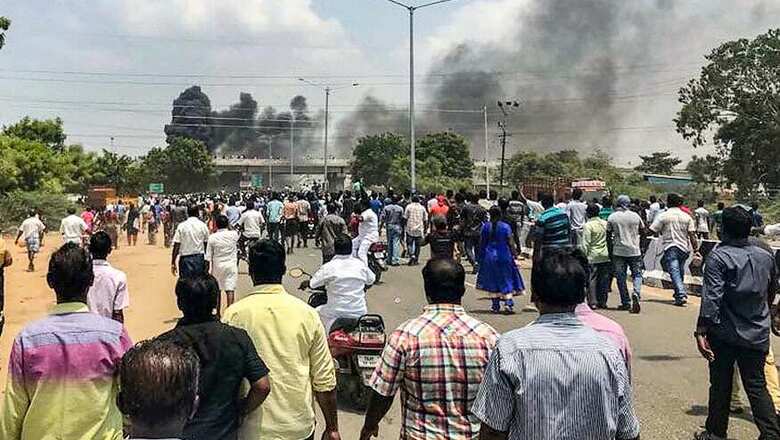
views
Thoothukudi: A schism exists in Thoothukudi that manifests every Monday morning outside the district collector’s office.
Dubbed Petition Day, Monday is when people, both for and against Vedanta-owned Sterlite Copper, crowd the district administration offices to file petitions. Armed with placards and banners, one group puts up spirited shows on how the plant was feeding off the locals while polluting their surroundings. Another group stages a counter protest in favour of a huge job source banished from town by external conspiratorial forces. Among the audience are police personnel, keeping watch lest things get out of hand.
The divide is more pronounced, and symbolic, in some villages circling the copper plant. In Meelavittan village, about 10 km from the collector’s office, black flags welcome you into some homes. The families in these homes are anti-Sterlite, steadfast about the permanent closure of the copper plant.
At tea shop in the villages, conversations over piping hot chai are invariably about the factory. Among the many allegations being talked about is Sterlite Copper being blamed for cancer cases.
T. Issaikiammal, a 29-year-old housewife, says: “My mother died of cancer 10 years ago. I didn’t know it was because of Sterlite then. But after many people say Sterlite causes health issues, I too think it is Sterlite that killed my mother.”
In stark contrast, tea-stall owners within 100 metres of the copper plant say they no such concerns.
Jagan, who has been running his stall for over 35 years in the area, says, “I have not had health problems. If the claims are true, would my family and I still be living here? After the shutdown of Sterlite, my revenues have decreased. I used to earn Rs 2,000 a day when Sterlite was operational and I used to employ two helpers. Since May-end, I hardly make Rs 500 a day and even that goes into paying my electricity bill. More than 100 trucks used to go in and come out of Sterlite earlier. The truck drivers were a major source of income for us. Now, we hardly make ends meet.”
He, however, concedes that he has faced problems because of the plant. “Sometimes a gust of wind dragged in smoke from the chimneys downward, leading to breathing issues,” says Jagan, quick to add that such occurrences were “rare”. “When it happened, I dipped a cloth in hot water and used it as a mask.”
So far, no evidence has been put forth on the Sterlite adversely affecting the health of Thoothukudi residents. According to the Tamil Nadu Cancer Registry Project (jointly by the department of Health and Family Welfare, government of Tamil Nadu and the Cancer Institute, Adyar), Thoothukudi ranks below the state average incidence of cancer occurrence for the year 2012-2015. There is no increased risk of cancer occurrence in Thoothukudi district compared to other districts in Tamil Nadu, the data shows. The post-2015 data will take time, the department added.
“We do not have data to say whether Sterlite causes cancer or not. It requires in-depth, long-term epidemiological studies before any opinion can be given,” said Dr R Swaminathan, Assistant Director, Cancer Institute-Adyar, Chennai.
On its website, Sterlite Copper has denied allegations that its operations cause cancer. “We strongly reject these unfounded allegations. We have data and research to prove that these allegations are not true, and would like to reiterate that the Sterlite Copper plant has been operating within all applicable environmental regulations and standards,” it says.
Listing out the regulations, Sterlite says, “The plant is equipped with full-fledged air pollution control measures and adequate solid waste management facilities. The plant follows Zero Liquid Discharge since inception, and all the effluent is treated and recycled back into operations, so there is no effluent discharge. The regulator, TNPCB, carries out regular monthly sampling across all village bore wells and has found no abnormalities. There is no scientific evidence for the allegations concerning health issues and the Crude Incidence Rate (Cancer incidence rate) at Tuticorin is much lower than the state average.”
Thoothukudi Divided
For all its perceived faults, Sterlite Copper has been a steady employer — nearly 4,000 jobs as direct employment; indirect employment runs in tens of thousands considering truck drivers and other logistical players benefitting from the plant.
Of late, Sterlite has been trying to engage with the people of Thoothukudi.
Sterlite Copper CEO P Ramnath says, “We feel there are some extraneous factors that have propagated falsehood and myths. It will take some time, but over a period of time, we will be able to win back the confidence of the people with outreach programmes.”
Since it stopped operations in March last year over non-renewal of a key licence, the plant has been out of operations for nine months now. For the first time in two decades, the copper smelter has been shut for several months.
As per CARE ratings, the shutdown has made India a net copper importer. “Domestic refined copper production has fallen by 54.8 % during H1 FY19. Fall in production is majorly attributable to the permanent shutdown of the 400 KT, Tuticorin smelter which accounted for 40% of the country’s copper smelting capacity. The drop in domestic production during H1 FY19 has led to the domino effect of a sharp increase in the country’s imports and fall in the exports thus turning India into a net importer of refined copper (India used to be the net exporter of refined copper).” This pertains to the April-September period.
The company won a favourable order from the National Green Tribunal and as it prepared to bounce back, protesters are waiting and watching after a near-upheaval against Sterlite in May led to a violent denouement, resulting in 13 deaths after police opened fire on protesters. An autopsy report showed that 12 people died of bullet injuries to the head or chest, and some were shot from behind. The deaths have had a chilling effect, sending people into silent rage.
The Intangible Loss
On the morning of May 22, several thousand people marched towards the office of the collector, demanding permanent closure of Sterlite. A multitude of small organisations, including fishermen groups, traders, student unions and several others joined in what was one of the largest agitations seen in Tamil Nadu.
A cataclysmic meltdown ensued after protesters clashed with policemen. Cops opened fire and the angry mob set the collectorate vehicles on fire.
The tragedy began unravelling. Among the people lost were teenagers; 17-year-old Snowlin J was one of them. Among her sparse possessions was a diary that documented her thoughts just before the bloodshed. God-fearing Snowlin aspired to become a lawyer. In the diary, apart from Biblical verses, she spoke about her love for her mother and eerie premonition of early death.
“I wanted to lie down on your lap and sleep.
Not just till the sun rises but till I’m buried in sand.”
A teary-eyed Vanitha keeps looking at her daughter Snowlin’s pictures framed in the hall of the one-storey house. She recalls how Snowlin loved black and how the colour may have taken her life, for Vanitha believes that the police went after those in black, the standard hue for protests in Tamil Nadu.
“We sang a song and left the house. While we were marching towards the collector’s office, my leg started aching and she scolded me and said I should return home if I can’t walk further. I stopped a few metres short of the protest site. She marched ahead and reached the frontline,” says Vanitha.
When police opened fire, little did Vanitha know that when shots rang out and ambulances rushed past her, it was her daughter who fell, shot at point-blank range. She came to know of it only after three hours.
Grieving families appear to be nursing scars, seven months after the killings. Strangely, families say the dead were not true-blue protesters, not ones to head off to protests enthusiastically, but were caught in the crossfire. It just so happened that they decided to participate to mark the 100th day of the protest.
The Big Brother
After the protests, there were arrests. Reports of hundreds picked up on charges of participating, and in some cases instigating, the agitations. The state lawyers’ forum swung into action to apply for bail at the district courts to free those arrested. While almost all of those arrested are free now, the backlash from the police department has turned Thoothukudi into a vitiated ground, fear and suspicion running wild.
Even now, there is heavy police deployment in Thoothukudi.
I was tracked within three hours after I began meeting locals. Police officers turned up wherever I went, video-recording my activities and questioning about my conversations with those who had participated in protests. Amid visits to villages near the plant, policemen in plainclothes loitered around.
After stepping out of the residence of Fatima Babu, coordinator of anti-Sterlite people’s movement and one of the key protest leaders against Sterlite Copper, a police officer came about with questions.
“Hello madam, I’m from CB-CID. What exactly did she say? Can you send us a copy of the recording?”
“I was getting her reaction. You can see it live on our channel this evening,” I replied.
At almost all confrontations from police officers, the usual question posed to the reporter was: “Where next?”
At Kumarareddiyapuram, a village near Sterlite Copper, reported frequently for allegations of environmental pollution by the factory, the crew was not allowed to shoot in the village. After several questions, two officers present right at the point of entry into the village, refused to allow me to interact with the people.
The Cat and Mouse Game
Ever since Sterlite Copper started operations, it has had a rough journey. In July 1997, Ramesh Flowers Limited alleged that a gas leak from the adjoining Sterlite Copper factory led to over 90 workers falling sick.
Many of the girls, who vomited and fainted, were hospitalised, the company alleged. However, Sterlite denied the allegation and blamed the factory for using chemicals that were prohibited.
A year later, an acid leak at the copper smelter resulted in injuries to five people. In the last 22 years, there have been reports of people in Thoothukudi complaining about gas leaks or release of toxic wastewater, allegedly linked to Sterlite. The factory was closed but only for a few days. This was in 1998.
In 2010, the Madras High Court directed the closure of Sterlite and found that the plant caused severe pollution as recorded by National 5 Environmental Engineering Research Institute (NEERI) in its 2005 report. This, too, lasted only for a few days as the Supreme Court stayed the Madras High Court order and allowed the copper plant to resume operations. The company had smooth sailing till March 2013 when a gas leak was reported in the town, and based on people’s complaints, the Tamil Nadu Pollution Control Board ordered the closure of Sterlite.
This lasted for three months and the Supreme Court directed the company to pay a penalty of Rs 100 crore for violating environmental norms. It was when the company was looking to double capacity in 2018 that protests began. After violence broke out on the 100th day of the protest, the Tamil Nadu government issued an order on permanent closure of the company. In its December order, the National Green Tribunal directed the pollution control board to renew licence for Sterlite in three weeks.
The Tarun Agrawal Committee, set up by the NGT last year, to investigate environmental allegations, said it detected a cat-and-mouse game by Sterlite Copper and the state pollution control board in authorising Sterlite to handle effluents.
Chennai-based environmentalist Nityanand Jayaraman has been protesting against the plant since 2005. “The first betrayal was when a factory that was not good enough for Ratnagiri was sought be pushed onto unsuspecting population in Thoothukudi. Subsequent to that, there has been a series of betrayals where the illegalities of Sterlite have been consistently brought out by people and by official organisations, including the Pollution Control Board, but the district administration has consistently supported Vedanta and betrayed the people,” he said.
“In 1996, there was a gas leak and the report found that the leak was from Sterlite but it was hushed up. Again, in 2013, there was a gas leak. Everybody knows who the culprit is, but the district administration did not come out openly. This factory has been shut down four times. And each time, the courts or the government have come to their rescue."
The Sterlite Constituency
In 1992, 500 acres of land was allocated for Sesa Sterlite, the company’s name before it was rechristened Vedanta Ltd, in Ratnagiri district’s Zadgaon village in Maharashtra. But a year later, the company received a letter from the District Collector, directing it to suspend construction work following agitation by the locals. The proposed plant could not be built because of the Maharashtra government’s stop-work order.
The Tamil Nadu government welcomed the company and the Tamil Nadu Pollution Control Board gave a consent letter for the copper smelter to start operations in 1996. Then chief minister J Jayalalithaa laid the foundation stone for the company to commence its operations. The parties in power did not oppose the company at any given point. In March, when protests began against the Sterlite Copper expansion plans, there was no political movement.
Actor and Makkal Needhi Maiam president Kamal Haasan extended support even before the violent showdown, while DMK president MK Stalin visited Thoothukudi after the protests. Soon, Thoothukudi turned into a political hunting ground for parties, with many leaders making a beeline for the town. Actor-turned-politician Rajinikanth, perceived to be holding a political position sympathetic to the BJP, took a stand that violence against the police by ‘anti-social’ elements was a factor for the protests turning into a tragic memory.
His statement — “if there are protests for every issue, Tamil Nadu would turn into a graveyard” – generated much anger for the popular actor, reflecting the polarisation around the issue of Sterlite Copper in Tamil Nadu.
The AIADMK government stepped in and ordered the closure of the plant. The same government that approved land for Sterlite to double its capacity, cancelled the land allocated for the company after the violent protests.
Ready for Round 2
The Supreme Court will hear the Tamil Nadu government’s petition challenging the NGT order on Sterlite in the coming days. This is the last ditch effort by the state government to ensure the closure of the copper smelter in Thoothukudi.
Sterlite Copper, however, maintains that it is on solid ground. “We will cross the bridge when we come to it. They (Tamil Nadu) have already approached the SC and the court directed them back to the NGT for maintainability and merits. I think we are on strong ground, but let us see what happens.”
If the state government fails and Sterlite wins the case, protests will erupt yet again. Fishermen community and protesters have vowed to fight against the plant.
Fatima Babu, who has been spearheading the protests and is also filing court cases against Sterlite, said, “There is seething anger and there is eerie silence. This quiet doesn’t imply that everything is done. We will not allow Sterlite to operate. If Sterlite is open because of the political clout of the industries, they will learn what people’s power really is. We will take to the streets and see to it that Sterlite is permanently shut. We’ll see what we can do based on the court verdict.”
The fishermen community was one of the first to stage protests against Sterlite since the late 1990s. It was the fishermen community that came in waves on May 22 to the district collector’s office on May 22 last year and is hurt that it gave the most lives during the firing.
Having claimed that they were brainwashed by the Left-wing outfit Makkal Adhigaram into marching towards the collector’s office when protests turned violent, the community has decided to protest, but in a peaceful way.




















Comments
0 comment